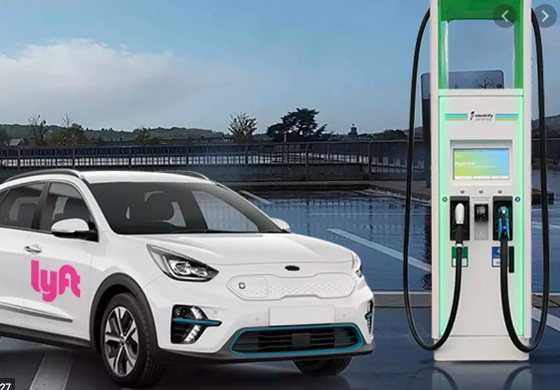Will Lyft go electric? Ride-hailing company Lyft has committed to do big things by the 2030 benchmark — led by making sure its fleet is 100 percent zero emission. In collaboration with Environmental Defense Fund, other initiatives will be included in coming years such as bringing in autonomous vehicles, and rolling out its Express Drive rental car partner program for ride- share drivers. The challenge will be getting its drivers to switch over to EVs, as Lyft will continue to be a mobile app company partnering driver/car owners to customers needing a ride. The company won’t block drivers who don’t have EVs from accessing their network and getting business; Lyft has to talk them into it. That will be without incentives. The company is counting on governments spiffing up their programs for clean air and fighting climate change.
share drivers. The challenge will be getting its drivers to switch over to EVs, as Lyft will continue to be a mobile app company partnering driver/car owners to customers needing a ride. The company won’t block drivers who don’t have EVs from accessing their network and getting business; Lyft has to talk them into it. That will be without incentives. The company is counting on governments spiffing up their programs for clean air and fighting climate change.
“We will aggressively promote and help drivers access incentive funds,” a Lyft told TechCrunch. “If policymakers do their part in the next few years, EVs should reach cost-parity with gasoline vehicles by mid-decade.”
Lyft will be working with EDF and other environment groups to lobby for EV incentives and charging infrastructure development. The challenge will be steep as Lyft drivers are used to getting good mileage in small, fuel efficient cars from Asian manufacturers. Another challenge will be Honda putting out a hybrid CR-V on the market soon, providing larger passenger and cargo space with great mileage from a non-EV.
Ford and VW working on electric vans: Ford Motor Company and Volkswagen AG signed agreements on June 10 that expand their global alliance and take the next step from their initial alliance forged July 2019. They’re seeing increased demand in commercial vehicles and high-performing electric vehicles in Europe and other regions. Their alliance will produce a medium pickup truck engineered and built by Ford, for sale by Volkswagen as the Amarok starting in 2022 within the Volkswagen Commercial Vehicles lineup. Next up will be a city delivery van built by VW’s commercial vehicle group; and later onto a 1-ton van created by Ford. By 2023, they’ll be powered by Volkswagen’s Modular Electric Drive (MEB) toolkit, expanding on Ford’s zero-emission capabilities in Europe. The two global automakers will also work with Argo AI to independently develop autonomous vehicles at scale based on Argo AI’s innovative self-driving technology. Argo AI is a Pittsburgh-based company in which Ford has ownership and development interests.
For those interested in Ford’s new Mustang Mach-E electric performance SUV, it’s coming equipped with a more precise predictor of available range. Mustang Mach-E’s innovative Intelligent Range can accurately estimate how much range the all-electric SUV has left, helping reduce anxiety about when and where customers can recharge.
NREL sees hope in blockchain tech: Blockchain continues to be taken more seriously as unexpected parties like the US Dept. of Energy’s National Renewable Energy Laboratory (NREL), based in Golden, Col., enters the game. But this won’t be about tapping into the highly volatile cryptocurrency capital market. The power grid is bringing in blockchain technology to help ensure the reliability, resiliency, and security needed to distribute energy. With this stability, NREL is ready to take on a major opportunity: how property owners can sell unused power from their rooftop solar panels. Blockchain will serve as a distributed digital record of actions agreed and performed by multiple parties, to facilitate moving clean energy and its efficient distribution effectively. NREL researchers have been evaluating the use of blockchain for transactive energy using hardware in the laboratory’s Energy Systems Integration Facility (ESIF). So far, they’re impressed.
Automating driving on hold: BMW Group and Mercedes-Benz AG put development cooperation in automated driving temporarily on hold. Their joined efforts on next-generation technology for automated driving will be placed on the back burner for now. Both companies are emphasizing that cooperation may be resumed at a later date and that the two companies’ underlying approach to matters such as safety and customer benefits in the field of automated driving remains highly compatible. Autonomous vehicle projects are being led by automakers in partnership with competitors and technology suppliers. As COVID-19 continues to hit all of the global markets, these ventures have to be placed on hold for now.
DOE funding advanced lithium-ion batteries: The US Dept. of Energy is making up to $12 million available for projects that address capability gaps for enhanced lithium-ion batteries, next-generation lithium-ion batteries, and next-generation lithium-based battery technologies. Working through the Office of Energy Efficiency and Renewable Energy’s Advanced Manufacturing Office and Vehicles Technologies Office, funding is available for projects that address these four areas: materials processing and scale-up; innovative, advanced electrode and cell production; designer materials and electrodes; and formation. DOE will be woking with National Laboratories to establish public-private partnerships that solve engineering challenges for advanced battery materials and devices, with a focus on de-risking, scaling, and accelerating adoption of new technologies. The agency is soliciting proposals for projects that can meet these objectives.



